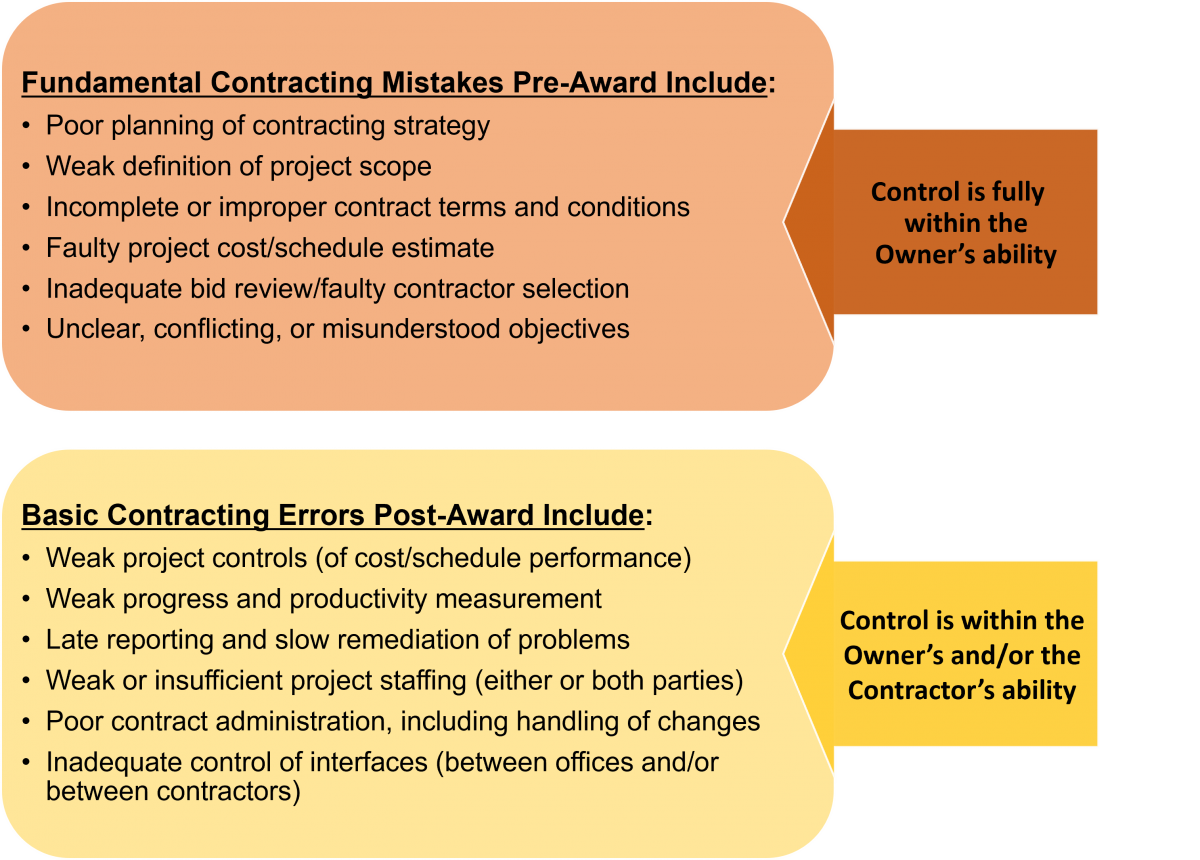Project contracting covers the spectrum of pre-award and post-award activities ... from developing and awarding contracts, through their administration.
Owners' good contracting practices avoid mistakes, adverse impacts,
and help ensure project success.
Why is contracting highly successful for some projects, while contracting for other projects is much less so... and can result in poorer than expected performance, disputes, or claims? Mistakes and their impacts made in the contracting process can be avoided. Good contracting practices facilitate good project management for both the owner and contractor, regardless of project scope.
While this article is written from an owner's perspective, its concepts and recommendations are also useful to contractors.
Mistakes made in contracting are not attributable to a particular project type, contract type, or geographic location... they occur before and after contract award, and they affect project outcome.

Contracting mistakes are project management mistakes. Why do these errors occur?
- Wrong strategy chosen ... for example, a lump sum basis applied to a poorly defined project (or applied to a high revamp project), resulting in a proliferation of changes
- Wrong bid review balance ... too focused on contractors' commercial offerings and not enough attention devoted to - and upgrading of - contractors' capabilities/execution plans/people
- Wrong contractual terms ... incomplete or ambiguous definition of scope, obligations, deliverables, completion requirements, or imposing onerous/inequitable risk conditions
- Wrong project targets ... poor quality/unrealistic cost and schedule estimate
- Wrong team composition ... underestimating the number or qualifications of resources needed for the project
- Wrong management procedures ... weak tools/practices used to steward project performance
Contracting Mistakes Directly Correlate with These Adverse Impacts
- Poor business results with negative impacts to ROR, ROI, NPV, etc.
- Increased project cost
- Longer project schedule, which is just as frequent as cost increases
- Quality, start-up, and operability problems
- Disputes and claims, along with damaged business relationships
10 Best Practices to Avoid Contracting Mistakes and Promote Project Success
- Project Definition: regardless of project or contract type, ensure that the project is well defined ... its objectives, scope, site conditions, schedule, and execution strategy are clear, complete, and suitable for obtaining good bids
- Contracting Strategy: consider segmentation of work vs. single source responsibility as well as ensuring that all viable compensation options are analyzed early and the optimum approach selected to fit the project; outline project risks and mitigation measures (both pre- and post-award) ... "select the right horse for the course"
- Contract Documents: use sound, proven, comprehensive contract templates that are then tailored for the project; ensure the contract satisfies the "4 Cs" ... clear, complete, concise, and consistent
- Project Estimate: ensure the cost/schedule estimate and its development basis is sound and considers factors such as site specifics, market conditions, execution strategy, labor availability/productivity, an appropriate contingency, etc
- Bid Review: never allow a bidder "buy" the contract with an unusually low commercial proposal ... ensure the bid review focuses on contractors' execution experience with similar projects, plans are tailored for the specific project, and evaluate the quality of key people to be assigned to the work
- Contract Award: select reputable/capable contractors; ensure both parties fully understand the contract requirements, as well as any special risks or unusual commitments; use team workshops after award to promote joint understanding and foster alignment
- Project Staffing: ensure before award that both contractor and owner resources are qualified, sufficient in number, and deployed on time to manage the project, including its interfaces
- Contract Administration: ensure timely/fair administration to maintain the sanctity of the contract terms; use good change management forms/procedures to steward potential and agreed changes
- Project Execution: weekly assessment and reporting of key performance indicators such as cost (expended, incurred, forecast), progress vs schedule, productivity, safety, and other critical issues
- Project Management: i) promote open communications at all levels (and foster a "we" vs "me" behavior), ii) recognize accomplishments, iii) promptly process information requests and scope variations, iv) don't allow disputes to fester, analyze and escalate disagreements until resolved, v) regularly monitor performance, closely steward against plan, and ensure that corrective actions are effective, and vi) be an example of honesty, integrity, and consistency ... strive to function as a single team, working together, toward a common goal
ABOUT THE AUTHOR

Stephen Liccini has over 40 years of international experience in project management, specializing in contracting, negotiating, project planning, claims and dispute resolution, training, auditing, business controls (financial and security), team building, cost/schedule practices, and all procurement activities.
sliccini@pathfinderinc.com
856-424-7100


